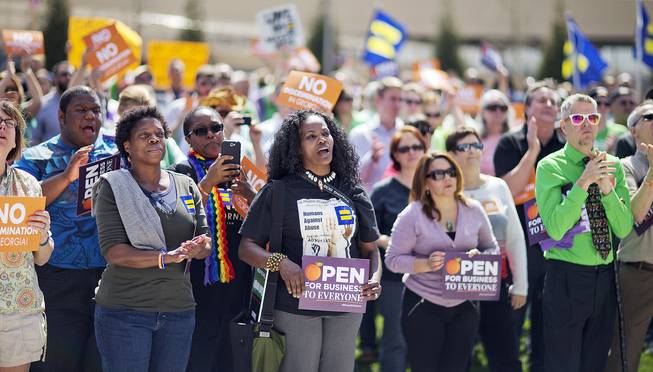
Associated Press
Protestors hold up signs during a rally against a contentious “religious freedom” bill March 17, 2015, in Atlanta. The Georgia Senate gave decisive approval to the bill, one of a wave of measures surfacing in at least a dozen states that critics say could provide legal cover for discrimination against gays and transgender people. Georgia Gov. Nathan Deal vetoed the bill.
Monday, April 4, 2016 | 2 a.m.

Kelvin Williams
In January, the state of Georgia introduced the Religious Liberty Bill. Known officially as the First Amendment Defense Act, it aims to “prohibit discriminatory action against a person who believes, speaks or acts in accordance with a sincerely held religious belief or moral conviction that marriage is or should be recognized as the union of one man and one woman.”
In other words, it allows business owners to refuse to serve same-sex couples.
When Kelvin Williams, founder of Atlanta-area telecommunications company 373K, found out about the bill, he announced on Twitter: “It’s time to relocate.”
Georgia Gov. Nathan Deal vetoed the Religious Liberty Bill on March 28, but the House speaker and lieutenant governor vowed to revive a version of the measure.
Williams said he planned to move his company to Delaware and Nevada. He spoke recently with The Sunday.
You reviewed every state in the country to decide which would be best to relocate your business. You decided on Delaware for your headquarters and Nevada for a branch office. What did you look for in locations?
We looked at whether there were gay marriages or civil unions allowed before the Supreme Court approved them (gay marriage has been legally recognized in Nevada since Oct. 9, 2014, well before the Supreme Court ruling June 26, 2015), and whether lawmakers had passed any kind of anti-discrimination and anti-bullying laws. Those were all done in Nevada, so that’s one of the reasons we picked it.
Delaware’s Economic Development Office reached out to us and asked what they could do to help. They explained different grants, but we didn’t need any grants. We did ask them to get us through the layers of red tape that exist in every public service commission. And of course, there was a personal call from the governor extending a personal welcome that really made us feel good.
Were there other states in the running?
A lot of cities and states reached out to us. It was crazy.
Did Georgia officials try to persuade you to stay?
We got calls from a couple of senators and different state officials asking us to stay. The problem is that the bill passed the Senate, so the image of Georgia already is tainted, and we would rather not grow here.
Do you think people courted you because of your company’s success or as a PR stunt since your announcement gained media attention?
We’re a very young company; we incorporated in April 2015. Over the past year, we’ve spent millions of dollars building our infrastructure, so at the end of 2015, we really hadn’t made any money. Now, we’ve started to get more state certification, and we’re operating in the black.
Why did one tweet from our tiny company get everybody on us? I don’t know. We have an interesting product, and we’re high tech — everybody wants a high tech company. But it also could be the PR. Everybody would like to show they’re not bigots.
Aside from LGBT rights, what appeals to you about Nevada?
I’ve been to Las Vegas many times, and it’s a great city. We used to say we’d have our annual company meetings in Las Vegas, only we don’t have an HR department to organize that. The joke was that the moment we formed an HR department, we’d all be fired.
You have said that Georgia was “generally oppressive.” Do you think Nevada will be more liberal?
Nevada is on the West Coast, and the more west you go in this country, the more open minded people are.
In a state that has Las Vegas, with all of its tourism, the powers that be have to be more liberal. People from all walks of life are constantly in and out, so the state has to be open-minded and accepting.
When I looked at the employees of 373K, there were only two of 20 that would not be affected by this law. Only two are Christian heterosexuals who have been in only one marriage. Everybody else is divorced, gay, Muslim. We’ve got a little bit of everybody. And that is what we want, to be in a state where whomever we pull in won’t have to worry about being discriminated against.
Do you think you’ll have better success recruiting in Nevada because people will be more inclined to work here instead of Georgia?
Yes. In telecommunications, the best engineers are employed, and it’s hard to get them to move.
We have a guy in Morocco who is very good at what he does. But would I want to invite him here to a state like Georgia, where he could be discriminated against? I want him to come to somewhere like Nevada that’s open minded. I think we’ll definitely get better employees when we relocate to a state that doesn’t do silliness.
Did you intentionally try to make your company that diverse or did it evolve organically?
I’ve always liked working in diverse groups, and we always wanted to be diverse. The company name, 373K, stands for 373 Kelvin, the point at which water boils. The company is named after me, because they say I’m a hothead. When you start with a gay, black man with a big mouth, diversity is going to follow.
Where in Nevada will you relocate?
We’re coming out in the next month to investigate the different neighborhoods — or gayborhoods. It’s one thing when you’re a tourist on vacation; it’s another when you’re going to move there.
It will come down to my food addiction. We’ll need to be where all the good restaurants are.
When do you plan to move?
There’s a whole process with paperwork, so it won’t be as fast as we want, but no later than the end of the year. We might be out by the end of summer.
We’re dead serious. There’s no way we’re going stay in the state and continue to pay taxes. I’m not going to fund hate.
If a law like this can pass here, that shows the mentality of the people in Georgia. Some of the hate mail we’ve gotten, from the — here’s the air quotes — “good Christians,” has been the most disgusting stuff I’ve seen in my life.
How do your employees feel about the move?
Everybody is amped up. It’s not so much the move as the big middle finger we’re throwing to Georgia. That’s the part they’re excited about.
We have employees all over the world, and some of our employees will stay in Georgia. Our CEO, for example, has a house and a kid in school, so leaving may be difficult. But anybody who wants to leave, we’ll pay to have them relocated.
In our offices, all we have are computers and a couple of filing cabinets. Our infrastructure is fixed and installed all over the world, so it’s not difficult for us to move.
Are you hoping other companies follow your lead?
There are a lot of businesses making noise, including Coca-Cola. A couple of other startups have reached out to us and asked for advice on leaving. One of them is following us to Nevada.
They faced the same issues we did. When I go to hire somebody, I need them for their skill set. I don’t care about their biology or faith. Can they do the job? That’s the only thing I need to know. And these other companies are in the same boat.
What was the motivation for the religious liberty bill?
Here in the South, blacks were segregated under the Jim Crow laws. In the ’60s, it became illegal to discriminate against people of color, but one group was excluded from the civil rights law, and that was the gays. So all that racial hatred that has been outlawed now can be directed at the gays.
Georgia passed a state constitution amendment to define marriage as between a man and a woman, so when the Supreme Court came out with its ruling, it made a lot of people mad. And that’s probably some of the reason for the First Amendment Defense Act.
Could anything persuade you to stay in Georgia?
We outlined what we want in a document called “A Compromise” that we sent to every representative in the Georgia Assembly.
If they want to pass this biased law, people should have to register with the government so it’s public knowledge, so I know before I come to your shop, that you’re going discriminate. And the business owners should have to put a sign up front with a list of all the sins they don’t approve of, in case I didn’t search online. That would show us who the bigots are.
If somebody listed all of the sins in the Bible and didn’t just discriminate against gays, I would support him or her. But divorce is mentioned more times in the Bible than anything about homosexuality. That’s why I believe this is more about re-elections and stirring up the base than it ever was about religion.
I’m a Christian myself, and I’ve got atheists and Muslims working for me. We respect each other’s religions.
We are sure lawmakers will never make these modifications, but hopefully we’ll find a radical Democrat who will stop them in their tracks.

Join the Discussion:
Check this out for a full explanation of our conversion to the LiveFyre commenting system and instructions on how to sign up for an account.
Full comments policy